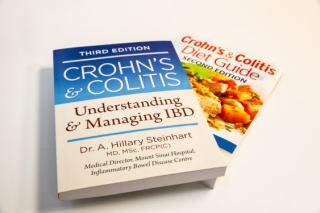Ask the expert: Dr. Hillary Steinhart answers your questions about Inflammatory Bowel Disease

Dr. Hillary Steinhart is the Medical Lead of the Inflammatory Bowel Disease Centre at Mount Sinai Hospital, Professor of Medicine in the Department of Medicine at the University of Toronto and holds a faculty appointment at the Institute of Health Policy, Management and Evaluation at the University of Toronto.
Dr. Steinhart divides his time between patient care, clinical research and teaching. He has published over 130 research papers and is on the editorial board for the journal Inflammatory Bowel Diseases. Dr. Steinhart is also an author of two books on IBD for patients and families, Crohn’s and Colitis Diet Guide and Crohn’s and Colitis: Understanding and Managing IBD, which just had its third edition released in October 2018.
We recently took to social media, where Dr. Steinhart was kind enough to answer some anonymous questions about IBD from our Instagram followers. Visit Sinai Health System on Instagram to learn more, and read on for some excellent questions and thoughtful answers from Dr. Steinhart.
Question: What is IBD?
Answer: IBD, or Inflammatory Bowel Disease, refers to any condition in which there is excessive inflammation of the gastrointestinal tract, but primarily refers to Crohn’s disease and ulcerative colitis.
Question: What are some of the obvious signs of Crohn’s/colitis?
Answer: The most common symptoms of the inflammatory bowel diseases (IBD), Crohn’s disease and ulcerative colitis, are a change bowel habits (most often diarrhea), abdominal pain and blood in the stool. However, Crohn’s and colitis can present in many different ways. Typically the symptoms occur over many weeks, months or even years and may come and go over time before a diagnosis is made. Any changes in bowel habits that last more than a few days should be checked by a doctor.
Question: I’ve been in remission for 10 years, on Imuran daily. What are the risks of stopping the meds?
Answer: That’s great news about your remission. There can be many risks to stopping medication. It’s best to check in with your doctor, who will know your specific case, and should be able to give you some great advice

Question: How does one get in to the clinic? Can you self-refer or do you need a doctor to refer?
Answer: We have seven gastroenterologists – all experts in IBD – at the Mount Sinai IBD Centre. We also have colorectal surgeons, nurses, a dietitian and soon to have a social worker. A referral from a doctor to one of the gastroenterologists or surgeons is usually needed to get into the clinic.
Question: I was recently diagnosed with IBD. Why am I losing my appetite?
Answer: In Crohn’s disease and ulcerative colitis, various parts of the intestinal tract become inflamed – inflammation leads to release of certain proteins that can suppress appetite into the bloodstream. If you are experiencing a loss of appetite, be sure to speak with your doctor about further strategies to prevent malnutrition and treat inflammation.
Question: Can my diet make a difference in the amount of inflammation in my gut?
Answer: If you have Crohn’s disease involving the small intestine, elimination of certain foods may result in reduced inflammation. For Crohn’s involving the large intestine and ulcerative colitis, diet does not presently appear to make a difference to levels of gut inflammation…. but there is research going on examining new dietary approaches.
Question: I’m looking for good, general dietary advice for people diagnosed with IBD. Any resources?
Answer: Along with your family doctor and gastrointestinal specialist, consider speaking to a registered dietitian. These professionals can provide safe, reliable and evidence-based direction for using diet to manage your concerns. There are also books that can offer some guidance – my book Crohn’s & Colitis Diet Guide may be helpful, too.
Question: Was my IBD caused by something I ate?
Answer: At this point, researchers have no evidence that any particular food, food additive, preservative or anything else directly leads to the development of IBD. If you have IBD, continue to eat foods that don’t adversely affect you, and seek out advice from your doctor and dietitians to maximize your health.
Read more about IBD at Sinai Health:












